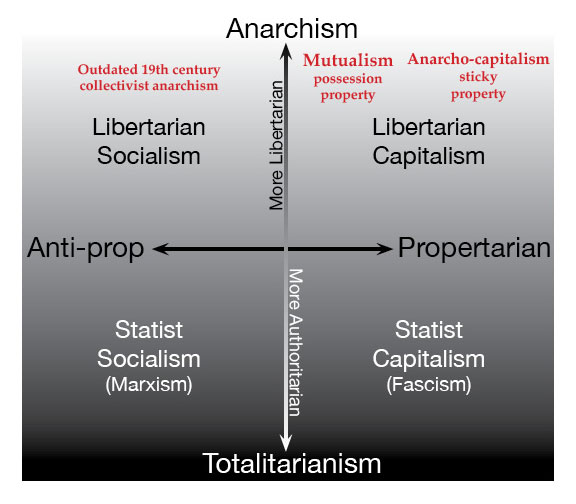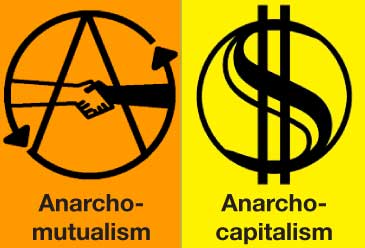May 11, 2018
Historically, anarchism, and more generally libertarianism, has been framed as two conflicting wings - collectivist and individualist anarchism. This division is centered on different conceptions of resource usage norms. Individualists favor usage norms which allow any individual or group to own resources, while collectivists would restrict a large class of goods - productive goods (the “means of production”) to certain specified collectives (generally the set of current workers.) However, as socialism and its related exploitation dogma became discredited in the 20th century, the collectivist anarcho-socialists (“social anarchists”) became irrelevant to anarchist theory. Today, the main schools of anarchism are both individualist - both capitalist in the no-state free market sense, with both embracing a type a private property.

We use “property” here in a broad sense, to mean some set of resource usage norms. Private property we define as a set of resource usage norms such that ownership of scarce resources is open to any individual or group. Individualist anarchists favor private property, as defined here. Nowadays, we generally use the more precise term "libertarian capitalist" or "propertarian." (See diagram.)
We libertarian capitalists agree pretty closely about original appropriation - how unowned resources become owned. We believe that some sufficient amount of “mixing one’s labor” with an unowned resource causes it to become owned by that laborer. We also believe that threshold issues such as how much labor is necessary to gain ownership is decided by convention, that is, by local consensus as determined by emergent legal norms or some other group decision process. Libertarian capitalists also agree that if one rightfully owns something, one may exclude others from using it, and that it is permissible to use appropriate responsive force in defense of it. We individualists universally agree that voluntary trade and gift are legitimate, and we celebrate free trade - the unfettered freedom to give and trade without being subject to aggression.
The primary, perhaps the only, part of these universal property norms that we libertarian capitalists disagree about is abandonment of previously owned resources. The question “When is a resource deemed to be abandoned by an owner?” separates libertarian capitalists who identify as mutualist from those who identify as anarcho-capitalist. In the broadest sense, the difference between a mutualist and an anarcho-capitalist is this:
Mutualists favor abandonment criteria which weakly favor the current owner, while anarcho-capitalists favor abandonment criteria which strongly favor the current owner.Since there is a continuum between weak and strong conditions for losing ownership, there is a continuum between mutualism and anarcho-capitalism.
What do we mean by “abandonment criteria?” We mean the conditions necessary and sufficient to lose ownership of a resource one owns. For mutualists, typical abandonment criteria are:
- Not maintaining continuous use of the resource.
- Renting out the resource to another person or group.
- Owning too much of a resource.
For anarcho-capitalists, one might think that the only abandonment criterion would be consent to gift or sell the resource. This would be mistaken. Even the most ardent anarcho-capitalists see the wisdom and necessity to account for abandonment and recognize conventions regarding salvaging of sunken ships, claiming abandoned vehicles, and so on. Thus, anarcho-capitalists agree with criterion number one above - that some sort of use must be maintained. The difference of opinion is actually about: What kind of action constitutes “continuous use?” Anarcho-capitalists consider speculation for a future use, maybe 20 years down the line, to be “use,” whereas mutualists generally would frown on such speculation. Similarly, an anarcho-capitalist would consider a summer vacation home, used once every year or two, as sufficient use to keep ownership, whereas a mutualist would more likely be calling for homeless people to squat there.
Has there ever been a good debate about the merits of the mutualist “possession” style of private property and anarcho-capitalist “sticky” private property? Readers are invited to provide an answer to this. Proudhon may have thought he did, but unfortunately he never conceived of property as naturally emerging resource usage norms. He contrasted possession private property with government decreed “property,” and famously found the latter either ”robbery” or “impossible.” All libertarian capitalists agree with that denunciation of government decreed “property.” We have our entitlement theory of property, based on empiricism and the nature of man. We don’t need stinkin’ rulers telling us what we can own!
Since libertarian capitalists, be they mutualist or anarcho-capitalist, agree on so much - indeed on all the property norms except abandonment - we may well ask where this divergence comes from, in terms of moral intuition and psychology. It seems that both schools have staked out what seems to them as a logical Schelling point. The anarcho-capitalist Schelling point is simple and obvious: Whoever owns it continues to own it. The mutualist Schelling point is also simple and obvious: Whoever has been using it owns it. These competing Shelling points pit consent against recent use. Both are reasonable.
Note that the sticky property position relies on history somewhat more than the possession property position, in the sense that possession property mainly (only?) looks at the most recent usage, and rejects prior ownership claims. Possession property is historically myopic compared to sticky property. This reflects a possible difference in moral psychology and intuition - that sticky propertarians tend to hold an entitlement theory of justice, whereas possession propertarians tend to hold an end-state theory of distributive justice. This becomes obvious from reading mutualist literature, where unused land is considered a root cause of poverty, and owning too much land is considered robbing one’s fellow man. Geoism and mutualism both suffer from this Physiocratic malady. It is revealing that mutualists often rail against unused land or houses or buildings, whereas for anarcho-capitalists such things are non-issues - off the radar - except as they relate to e.g. government rent control.
Possession propertarians are strongly in favor of dispersal of land to “the people.” They seem to favor an end-state - a social result - with many small landowners, over a laissez faire “let the market decide” approach to land holding parcel sizes and distribution. Are there historical cases where land division into smaller and smaller parcels became a problem? Yes, that was a problem for classical feudalism, and also for colonial feudalism in e.g. Mexico and other parts of Latin America. At some point, a parcel became too small to be profitably farmed. While feudal structures forced households to subdivide and bequeath only to kin, the rise of capitalism allowed anyone to buy and sell and own land, which helped realize agricultural economies of scale. Of course, we are long past the agricultural age where 99% of people do farm related work, but the same scale concerns apply.
Does possession property tend to push land and home ownership to a level below optimal efficiency? Let’s try a thought experiment. Suppose that, contrary to government propaganda, owning a home is not necessarily a good thing. (Since land-bound citizens are easy to tax and control, this is by no means a stretch.) Let us suppose that, in our modern information age, people will switch workplaces, location, and even occupations a number of times in their lives. Let’s assume that people are also mobile for other reasons, such as to maximize freedom, resist extortion efforts, enjoy affinity groups of like-minded people, and so on. Then it is quite possible that, for many, renting is more efficient and provides a better quality of life than home ownership. In such a world, it would seem that sticky property would be preferable, since that leaves the distribution of self-owned homes versus rented homes up to peoples’ choice - the market - rather than antiquated agrarian land conventions, in this case, possession property.

In a world where people can “live off their laptop” and telecommute from cyberspace, does it make sense to favor land-boundedness by supporting possession property? Anarcho-capitalists say “no,” and celebrate the opportunity to “vote with one’s feet,” avoid statist extortion, evade regulation, and become a sovereign individual, facilitated by the ability to rent a place (and an internet connection) anywhere we damn well please. To us, possession property is like a mule-drawn plow - an outdated remnant of the agricultural age.
